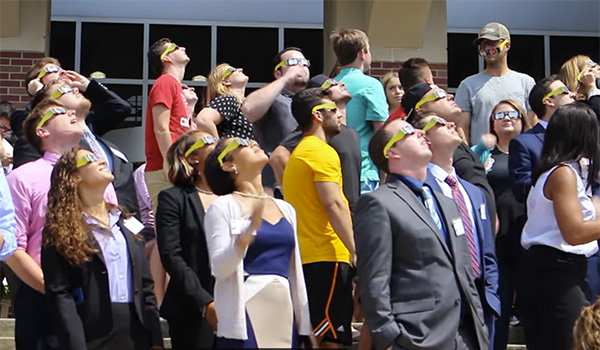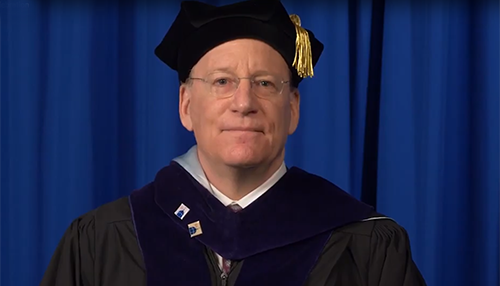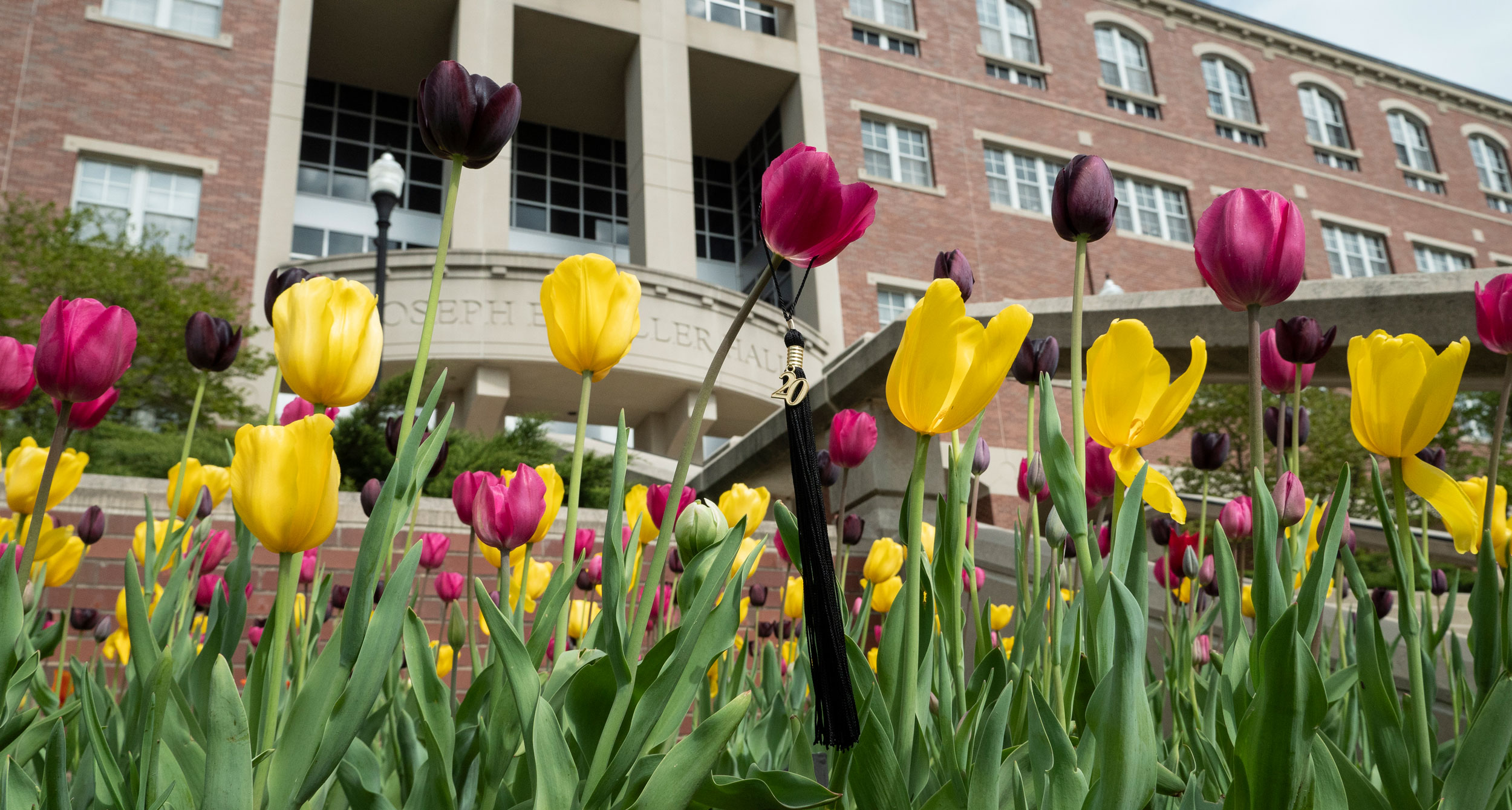Class of 2020: Sun will return to the sky
On behalf of our faculty and staff, it is my privilege to welcome you virtually to the University of Dayton School of Law’s first ever Degree Conferral Ceremony.
The first day of orientation for those of you in the three-year JD program was Aug. 21, 2017. I’m sure you will all remember your first bonding exercise on that beautiful, clear but somehow strange day. You went outside — weird looking glasses affixed to your faces — and together you stared straight up at the sun.
 Well, eclipses have been thought to portend change since ancient times, and that was the first total solar eclipse visible in the United States since 1918, the year — as we all know now — of the last great worldwide pandemic.
Well, eclipses have been thought to portend change since ancient times, and that was the first total solar eclipse visible in the United States since 1918, the year — as we all know now — of the last great worldwide pandemic.
Today, at this difficult time, when we know how painful and yes, terrifying, change can be, we also celebrate change.
“We celebrate a momentous change in all of your lives.”
We celebrate a momentous change in all of your lives, your successful transition out of what has been for many a lifetime of preparation into what will become a lifetime of practice.
In my own life, I have experienced some very significant changes, both personal and communal. Living in Southeast Asia in 1986, I was in the Philippines when the half election and half revolution People Power movement swept away the Marcos dictatorship.
I started my own career as an international law professor in 1990, the year after the fall of the Berlin Wall and the end of the Communist era.
And, I was in Egypt in 2011 when the Arab spring brought down the Mubarak regime.
 I have learned something from these experiences. Major changes are generally not linear, but rather manifest themselves in something like the science of punctuated evolution, slowly and then all at once — or, as Ernest Hemingway famously attributed to his character, Mike Campbell’s bankruptcy in The Sun Also Rises, it happened “gradually and then suddenly.”
I have learned something from these experiences. Major changes are generally not linear, but rather manifest themselves in something like the science of punctuated evolution, slowly and then all at once — or, as Ernest Hemingway famously attributed to his character, Mike Campbell’s bankruptcy in The Sun Also Rises, it happened “gradually and then suddenly.”
The Marcos regime in the Philippines, the Communist era in the Soviet Union, and the Mubarak dictatorship in Egypt all seemed as if they would never change, as if they were made of granite — and yet they all collapsed seemingly overnight.
On the day I arrived in Cairo on the 22nd of January, 2011, I went to dinner with a group of people. One of them, an Egyptian intellectual of some standing, pointed out a group of wealthy looking patrons at a neighboring table. He commented that there sat the family of the President of Egypt’s son.
Hosni Mubarak had been the autocratic President of Egypt for 30 years, and he had designated that his son, Gamal, would be his heir to the presidency.
With this in mind, the intellectual confidently proclaimed that we were in the company of the next first family of Egypt. Yet, a mere seven dramatic days later, as I left on one of the last flights out of the country, it was clear to the world that the Mubarak era had come to a thundering end. His son would not become president.
Certainly, this observation regarding the punctuated evolution of change applies most definitively to the present moment. Even as late as January and even February, few of us could foresee that our entire lives were about to be fundamentally altered.
I have also learned that in a period of rapid change, it is difficult to comprehend clearly the implications of what is happening. When I began teaching international law after the fall of the Berlin Wall, every day there would be some development that no one had previously thought possible. In May Latvia declared independence from the Soviet Union. In June it was Moldova, and in July it was Ukraine. In September East and West Germany agreed to unify. All through the fall, in the lead-up to the first Gulf War, the United Nations for the first time in its history began to function as it was intended in 1945. The whirlwind of developments was disorienting. The entire global order had been built around the premise of the Cold War, and no one could figure out for many years to come how to assess the sudden and dramatic changes.
Indeed, we are living through such a time today. We have been arguing, at least since the New Deal in the 1930s, about how much to socialize the economy, and yet in one week, with little opposition, Congress passed the $2 trillion CARES Act, the largest short-term American social relief program in history by far. What will all of this mean for the historic battle for primacy between social democrats and free market conservatives? None of us situated presently in the eye of this storm can know.
In legal education, in the space of one week, every law school in the country, including ours, went 100% online, something previously unthinkable. And, again none of us can now understand the potentially profound implications for legal education in the future.
There is no doubt that you all will be sorting out the meaning of the present moment for years to come.
I’m sure you all feel a certain heaviness from your siloed havens, where you are quarantining in place. This is not the day any of us envisioned to celebrate all of the wonderful things you have done as J.D., LL.M. and M.S.L. students at UDSL. But, the truth is that none of us have any choice about this day. All we can choose is to be brave in the face of fearful change.
“Your challenge today, Class of 2020, is to boldly walk straight into the dark tunnel of such change, as difficult and scary as that might be.”
So, your challenge today, Class of 2020, is to boldly walk straight into the dark tunnel of such change, as difficult and scary as that might be.
Among the myriad of conflicting tendencies that we all have, your challenge is to find your tendency for strength.
“This is your World War II. This is your 9/11.”
This is your World War II. This is your 9/11.
Today, as you head into bar preparation, and as you then transition into practice at what promises to be a difficult economic environment, your greatest challenge is to find and exercise that inner muscle of resilience that I know you all possess.
This fearlessness in the face of change is in some ways at the very core of what the University of Dayton is about. Our founders, the order of the Society of Mary, grew out of the anti-Catholic tumult of the French Revolution, and the order’s own founder, the Blessed William Joseph Chaminade, overcame his own fears to continue working as a priest at a time when that could have cost him his life. He led by example, teaching us to courageously embrace change by, as we often quote him, “reading the signs of the times.”
 And, I think we can also learn from our Hindu brothers’ and sisters’ approach to change. The Hindus have a trinity of their own, a triple deity of supreme divinity: Brahma, the creator, Vishnu, the preserver, and Shiva, the destroyer.
And, I think we can also learn from our Hindu brothers’ and sisters’ approach to change. The Hindus have a trinity of their own, a triple deity of supreme divinity: Brahma, the creator, Vishnu, the preserver, and Shiva, the destroyer.
Yes, Shiva, the destroyer. The Hindu understanding is that without the cosmic force of change, you can’t have renewal and creation. So, like our Marianist founders, Hinduism teaches us to be brave in the face of fearful change.
Times such as these make me appreciate what I have in my life. And, I want you all to know how much I appreciate you. I appreciate your spirit, I appreciate your dedication to our common profession, and I appreciate the humanity and caring for each other that you have all demonstrated during this difficult time.
Be brave. The moon will wane, and the sun will return to the sky.